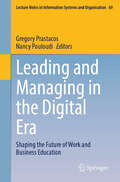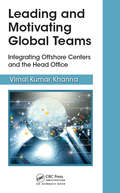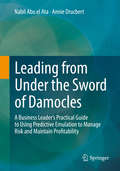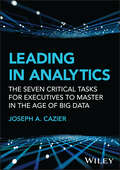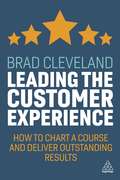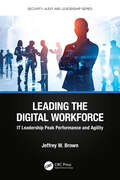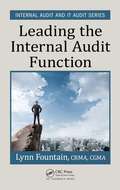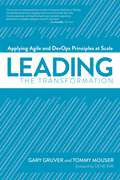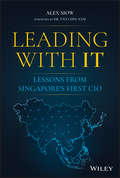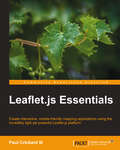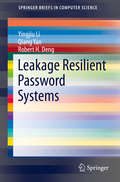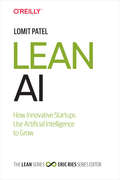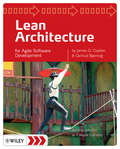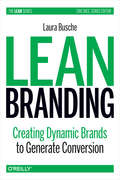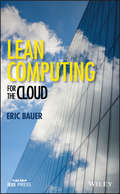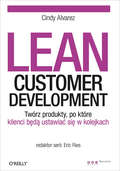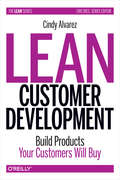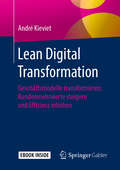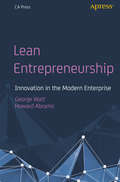- Table View
- List View
Leading and Managing in the Digital Era: Shaping the Future of Work and Business Education (Lecture Notes in Information Systems and Organisation #69)
by Nancy Pouloudi Gregory PrastacosRapidly emerging digital technologies such as artificial intelligence, robotics, the Internet of Things, blockchain, and virtual and augmented reality are driving profound changes in the workplace and society. These technologies are radically transforming areas of cognitive and physical work while opening up new opportunities for complex decision-making and increased efficiency. As a result, a new set of skills and a new style of leadership is required, where digital savviness is essential, together with an increased focus on collaboration, transparency, entrepreneurship, diversity, and inclusion. This book, organized in six parts, presents key developments of the digital age in leadership, management, the future of work, and business education. Part I, Governance in the Digital Era, sets the scene by reviewing the challenges that the digital era presents for policy makers at national and global levels. This research is complemented by research at the organizational level in Part II, Strategy and Entrepreneurship in the Digital Era, that discusses strategic issues that organizations of different sizes and levels of digital maturity face. Part III, Innovation and digital transformation, presents examples from different sectors, where AI and other innovative technologies are integrated in business. Part IV, The Future of Work, focuses on the changing conditions of workspaces and their implications for human resource management and the future of work. Part V, Leadership and Skills for the Digital Era, explores the impact of this changing business and societal landscape and studies the leadership style and skills needed in these conditions. Finally, Part VI, The Future of Business Education, studies how such skills and leadership may be cultivated in business education and draws lessons for the future. The book is based on a selection of the best papers on this topic presented at the international conference LMDE held in Athens, Greece, in June 2023.
Leading and Motivating Global Teams: Integrating Offshore Centers and the Head Office (Best Practices in Portfolio, Program, and Project Management)
by Vimal Kumar KhannaThis book provides techniques for offshore center managers and head office managers to motivate and manage globally distributed teams, which are spread across the offshore center and the head office, and thereby achieve higher productivity. Readers learn how to integrate the offshore center with the head office to make the offshore team an extension of the head office. While integrating teams with the head office, offshore center managers can still retain independence and authority to meet team aspirations. <P><P>The book provides insight into devising new organizational structures to balance the authority and responsibilities of offshore center and head office managers. Head office managers responsible for managing globally distributed projects learn how to achieve a higher success rate on their projects and be better rewarded for their efforts in offshoring. Head office managers also learn techniques to make more significant contributions in their expatriate assignments to the offshore center. <P><P>This book guides both the offshore center managers and the head office managers to fully realize the potential of the offshore center, which can result in higher revenues and profitability.
Leading and Motivating Global Teams: Integrating Offshore Centers and the Head Office (Best Practices in Portfolio, Program, and Project Management)
by Vimal Kumar KhannaThis book provides techniques for offshore center managers and head office managers to motivate and manage globally distributed teams, which are spread across the offshore center and the head office, and thereby achieve higher productivity. Readers learn how to integrate the offshore center with the head office to make the offshore team an extension of the head office. While integrating teams with the head office, offshore center managers can still retain independence and authority to meet team aspirations. The book provides insight into devising new organizational structures to balance the authority and responsibilities of offshore center and head office managers. Head office managers responsible for managing globally distributed projects learn how to achieve a higher success rate on their projects and be better rewarded for their efforts in offshoring. Head office managers also learn techniques to make more significant contributions in their expatriate assignments to the offshore center. This book guides both the offshore center managers and the head office managers to fully realize the potential of the offshore center, which can result in higher revenues and profitability.
Leading from Under the Sword of Damocles: A Business Leader's Practical Guide To Using Predictive Emulation To Manage Risk And Maintain Profitability
by Nabil Abu el Ata Annie DrucbertGlobalization trends and the rapid pace of technological innovations have introduced unprecedented change and uncertainty. For unprepared businesses, the drivers of the Fourth Industrial Revolution will become a constant source of surprise and crises will unfold at an ever-increasing rate. To thrive under these conditions, companies must adopt new risk management technologies and practices that enable business leaders to better anticipate and adjust to changing dynamics.This book helps readers understand how algorithm-based predictive and prescriptive analytics principles can be used to control risk in today’s dynamic business environment. It serves as a reference guide for business leaders and risk management practitioners of companies that are global in reach or operate dynamically complex systems. Using the technological and scientific innovations presented in this book, business leaders can gain a wider understanding of risk and prescriptively determine which actions are necessary to ensure the business is optimally positioned to meet its stated long-term goals and objectives.Case studies show how the presented methods can be practically applied to preemptively expose risks and support decisions to optimize, transform or disrupt current business models, strategies, organizational structure and information systems when necessary to maintain a market position or outperform competitors.These methods have been proven through hundreds of client cases. By using mathematical emulation to link business risks to strategic imperatives, it becomes possible to achieve a higher annual profit margin and better growth. As we enter the Fourth Industrial Revolution, companies that are able to expose risks caused by dynamic complexity and maintain the alignment between the goals of the business and operational execution will be better prepared to make the shifts necessary for long-term success and keep the business moving toward its goals.
Leading in Analytics: The Seven Critical Tasks for Executives to Master in the Age of Big Data (Wiley and SAS Business Series)
by Joseph A. CazierA step-by-step guide for business leaders who need to manage successful big data projects Leading in Analytics: The Critical Tasks for Executives to Master in the Age of Big Data takes you through the entire process of guiding an analytics initiative from inception to execution. You’ll learn which aspects of the project to pay attention to, the right questions to ask, and how to keep the project team focused on its mission to produce relevant and valuable project. As an executive, you can’t control every aspect of the process. But if you focus on high-impact factors that you can control, you can ensure an effective outcome. This book describes those factors and offers practical insight on how to get them right. Drawn from best-practice research in the field of analytics, the Manageable Tasks described in this book are specific to the goal of implementing big data tools at an enterprise level. A dream team of analytics and business experts have contributed their knowledge to show you how to choose the right business problem to address, put together the right team, gather the right data, select the right tools, and execute your strategic plan to produce an actionable result. Become an analytics-savvy executive with this valuable book. Ensure the success of analytics initiatives, maximize ROI, and draw value from big data Learn to define success and failure in analytics and big data projects Set your organization up for analytics success by identifying problems that have big data solutions Bring together the people, the tools, and the strategies that are right for the jobBy learning to pay attention to critical tasks in every analytics project, non-technical executives and strategic planners can guide their organizations to measurable results.
Leading the Customer Experience: How to Chart a Course and Deliver Outstanding Results
by Brad ClevelandMany organizations and leaders struggle to respond effectively to fast-evolving customer expectations driven by innovations in products, services and technologies such as AI and mobile. Failing to build the necessary strategy, culture and processes, they suffer from high costs, dissatisfied customers and brand damage. The mandate to get customer experience right is real and urgent. Leading the Customer Experience is a guide to shaping experiences that win loyalty and deliver outstanding business results. It provides a bold, step-by-step approach that will get you and your team pointed in the right direction. And equipped to make sound decisions along the way. Leading the Customer Experience is easy to understand and imminently practical. It is based on the author's extensive experience both as a founding partner of one of the world's most influential customer management organizations, and his work with B2B and B2C organizations in the private and public sectors.The author's down-to-earth explanations cut through jargon and clutter, while stories and examples bring important principles to life. Leading the Customer Experience is relatable to anyone leading, managing or aspiring to better understand customer experience.
Leading the Customer Experience: Inspirational Service Leadership
by Sarah CookLeading the Customer Experience explores the relationship between leadership behaviour and exceptional service. Most organisation’s strategic aims and goals centre on the delivery of excellent service. Loyal customers not only keep buying from a company but also recommend the business to others. It is clear that managers and leaders throughout an organisation have a key influence on the experience that customers receive. How leaders behave has a direct impact on their team member’s motivation to go the extra mile to deliver excellent service for the customer. Sarah Cook’s vision for Leading the Customer Experience is to provide practical advice, tools and techniques for managers in how to effectively lead and motivate their team to deliver the best possible customer service. This book encapsulates her research on the behaviours of leaders who successfully create an environment where employees deliver exceptional service and she brings a pragmatic and business focused approach to the topic. Each chapter contains a variety of case study examples from businesses in UK and Europe, Asia Pacific, US and BRIC countries. These include service organisations in the financial sector, manufacturing, hospitality, transport, healthcare, public and third sectors.
Leading the Digital Workforce: IT Leadership Peak Performance and Agility (Security, Audit and Leadership Series)
by Jeffrey W. BrownFuture IT leaders won't be technology leaders, they'll be business leaders who understand technology. Leading the Digital Workforce takes a fresh look at technology leadership, exploring how to lead and manage in today’s digital workplace where the pace of change is exponential. This book walks you through building personal resiliency and avoiding stress and burnout to creating a strategy, building a high-performance team, and examining how technology will change the workforce of the future. Technology leadership requires a unique set of skills, which is why traditional leadership approaches don't always work. This book provides actionable advice on how to create a culture of innovation while driving successful change initiatives. Leading the Digital Workforce provides strategies for empowering people, optimizing processes, and inspiring innovation. This book offers insights into managing change, leveraging technology, and building strong relationships within your organization, including how to understand and work with company culture. Finally, it shares strategies for using technology and innovation to create a competitive edge to unlock new opportunities. Leading the Digital Workforce is essential reading for IT leaders who want to develop their skills, stay ahead of the digital curve, and lead their organizations into the future. No matter if you’re a new IT leader, an aspiring one, or a seasoned leader who’s been at it for years, there’s something in this book that will help you level up your game.
Leading the Internal Audit Function (ISSN #1)
by Lynn FountainIn this book, the author presents lessons learned from her extensive experience as a CAE to help internal auditors understand the challenges, issues, and potential alternative solutions when executing the role. The book explains how to clarify management expectations for the internal audit and balance those expectations with the IIA Standards. It examines the concept of risk-based auditing and explains how to determine whether management and the internal audit team have the same objectives. It also looks at the internal auditor's role in corporate governance and fraud processes.
Leading the Transformation: Applying Agile and DevOps Principles at Scale
by Gary Gruver Tommy MouserSoftware is becoming more and more important across a broad range of industries, yet most technology executives struggle to deliver software improvements their businesses require.Leading-edge companies like Amazon and Google are applying DevOps and Agile principles to deliver large software projects faster than anyone thought possible. But most executives don't understand how to transform their current legacy systems and processes to scale these principles across their organizations.Leading the Transformation is executive guide, providing a clear framework for improving development and delivery. Instead of the traditional Agile and DevOps approaches that focus on improving the effectiveness of teams, this book targets the coordination of work across teams in large organizations—an improvement that executives are uniquely positioned to lead.
Leading with IT: Lessons from Singapore's First CIO
by Alex SiowExplore the insights of a world-leading CIO as he expounds on the challenges faced by technology executives and how to overcome them As the pace of change in business continues to rapidly accelerate, Chief Information Officers and Chief Technology Officers are often left with accountability for future-proofing their organizations. Renowned professor, executive, and author Alex Siow shows you how you can meet that challenge while managing the information overload that often accompanies these positions. In Leading with IT: Lessons from Singapore’s First CIO, the author uses his expansive and impressive experience in academia and industry to lead you down a path to achieving success as a CIO or CTO. Filled with practical tips, case studies, and personal insights, the book discusses: The management of legacy information and telecommunications technology The information overload often suffered by technology executives How to motivate and mentor a workforce How to manage change effectively The fostering of innovation The future of money, work, and artificial intelligence Perfect for CIOs, CTOs, and the executives, managers, and employees who work with and for them, Leading with IT delivers an engaging and insightful exploration of what it takes to achieve astounding results at the intersection of technology and business.
Leading with Sound: Proactive Sound Practices in Video Game Development
by Rob BridgettLeading with Sound is the must-have companion guide to working on video game projects. Focused on the creative, collaborative, philosophical and organizational skills behind game sound and eschewing the technical, this book celebrates the subjects most essential to leading with sound in video game development at any level. Refuting the traditional optics of sound as a service in favour of sound as a pro-active visionary department, , this book examines each of the four food-groups of dialogue, sound design, music and mix, not through the usual technical and production lenses of ‘how’ and ‘when’, but the essential lens of ‘why’ that enables leadership with sound. Leading with Sound is essential reading for aspiring sound designers, inside and outside of the classroom, as well as experienced professionals in the game industry.
Leaflet.js Essentials
by Paul Crickard IIIIf you are a web developer working with geospatial concepts and mapping APIs, and you want to learn Leaflet to create mapping solutions, this book is for you. You need to have a basic knowledge of working with JavaScript and performing web application development.
League of Legends: Realms of Runeterra (Official Companion)
by Riot GamesUnlock the mysteries and magic within League of Legends, one of the world's most popular video games, in this encyclopedic and collectible companion book that explores the game's epic lore. Embark on a journey through the realms of Runeterra in this first-ever collectible companion book, published to celebrate the game's tenth anniversary. Spanning the farthest reaches of this universe and venturing into uncharted territory, this encyclopedic compendium connects players to the rich storytelling that inspires all the action. Inside, you'll find:An expedition through eleven regions, chronicling conflicts, entrenched rivalries, and covert alliancesHundreds of illustrations, including never-before-seen maps and artworkInsights into the heroes, flora, fauna, architecture, politics, and technologies from all corners of this worldOriginal narratives that bring the cultures of Runeterra to lifeLeague of Legends is an online game played by millions of people around the world, offering endless engagement with an expanding roster of champions, frequent updates, and a thriving esports scene. This volume is an essential reference for fans everywhere.
Leakage Resilient Password Systems
by Yingjiu Li Qiang Yan Robert H. DengThis book investigates tradeoff between security and usability in designing leakage resilient password systems (LRP) and introduces two practical LRP systems named Cover Pad and ShadowKey. It demonstrates that existing LRP systems are subject to both brute force attacks and statistical attacks and that these attacks cannot be effectively mitigated without sacrificing the usability of LRP systems. Quantitative analysis proves that a secure LRP system in practical settings imposes a considerable amount of cognitive workload unless certain secure channels are involved. The book introduces a secure and practical LRP system, named Cover Pad, for password entry on touch-screen mobile devices. Cover Pad leverages a temporary secure channel between a user and a touch screen which can be easily realized by placing a hand shielding gesture on the touch screen. The temporary secure channel is used to deliver a hidden message to the user for transforming each password symbol before entering it on the touch screen. A user study shows the impact of these testing conditions on the users' performance in practice. Finally, this book introduces a new LRP system named ShadowKey. Shadow Key is designed to achieve better usability for leakage resilient password entry. It leverages either a permanent secure channel, which naturally exists between a user and the display unit of certain mobile devices, or a temporary secure channel, which can be easily realized between a user and a touch screen with a hand-shielding gesture. The secure channel protects the mappings between original password symbols and associated random symbols. Unlike previous LRP system users, Shadow Key users do not need to remember anything except their passwords. Leakage Resilient Password Systems is designed for professionals working in the security industry. Advanced-level students studying computer science and electrical engineering will find this brief full of useful material.
Leaks, Hacks, and Scandals: Arab Culture in the Digital Age (Translation/transnation Ser. #40)
by Tarek El-ArissHow digital media are transforming Arab culture, literature, and politicsIn recent years, Arab activists have confronted authoritarian regimes both on the street and online, leaking videos and exposing atrocities, and demanding political rights. Tarek El-Ariss situates these critiques of power within a pervasive culture of scandal and leaks and shows how cultural production and political change in the contemporary Arab world are enabled by digital technology yet emerge from traditional cultural models.Focusing on a new generation of activists and authors from Egypt and the Arabian Peninsula, El-Ariss connects WikiLeaks to The Arabian Nights, Twitter to mystical revelation, cyberattacks to pre-Islamic tribal raids, and digital activism to the affective scene-making of Arab popular culture. He shifts the epistemological and historical frameworks from the postcolonial condition to the digital condition and shows how new media challenge the novel as the traditional vehicle for political consciousness and intellectual debate.Theorizing the rise of “the leaking subject” who reveals, contests, and writes through chaotic yet highly political means, El-Ariss investigates the digital consciousness, virality, and affective forms of knowledge that jolt and inform the public and that draw readers in to the unfolding fiction of scandal.Leaks, Hacks, and Scandals maps the changing landscape of Arab modernity, or Nahda, in the digital age and traces how concepts such as the nation, community, power, the intellectual, the author, and the novel are hacked and recoded through new modes of confrontation, circulation, and dissent.
Lean AI: How Innovative Startups Use Artificial Intelligence to Grow
by Lomit PatelHow can startups successfully scale customer acquisition and revenue growth with a Lean team? Out-of-the-box acquisition solutions from Facebook, Google, and others provide a good start, but the companies that can tailor those solutions to meet their specific needs, objectives, and goals will come out winners. But that hasn’t been an easy task—until now.With this practical book, author Lomit Patel shows you how to use AI and automation to provide an operational layer atop those acquisition solutions to deliver amazing results for your company. You’ll learn how to adapt, customize, and personalize cross-channel user journeys to help your company attract and retain customers—to usher in the new age of Autonomous Marketing.Learn how AI and automation can support the customer acquisition efforts of a Lean StartupDive into Customer Acquisition 3.0, an initiative for gaining and retaining customersExplore ways to use AI for marketing purposesUnderstand the key metrics for determining the growth of your startupDetermine the right strategy to foster user acquisition in your companyManage the increased complexity and risk inherent in AI projects
Lean Architecture
by James O. Coplien Gertrud BjørnvigMore and more Agile projects are seeking architectural roots as they struggle with complexity and scale - and they're seeking lightweight ways to do itStill seeking? In this book the authors help you to find your own pathTaking cues from Lean development, they can help steer your project toward practices with longstanding track recordsUp-front architecture? Sure. You can deliver an architecture as code that compiles and that concretely guides development without bogging it down in a mass of documents and guesses about the implementationDocumentation? Even a whiteboard diagram, or a CRC card, is documentation: the goal isn't to avoid documentation, but to document just the right things in just the right amountProcess? This all works within the frameworks of Scrum, XP, and other Agile approaches
Lean Branding: Creating Dynamic Brands to Generate Conversion (Lean (o'reilly) Ser.)
by Laura BuscheEvery day, thousands of passionate developers come up with new startup ideas but lack the branding know-how to make them thrive. If you count yourself among them, Lean Branding is here to help.This practical toolkit helps you build your own robust, dynamic brands that generate conversion. You’ll find over 100 DIY branding tactics and inspiring case studies, and step-by-step instructions for building and measuring 25 essential brand strategy ingredients, from logo design to demo-day pitches, using The Lean Startup methodology’s Build-Measure-Learn loop.Learn exactly what a brand is—and what it isn’tBuild a minimal set of brand ingredients that are viable in the marketplace: brand story, brand symbols, and brand strategyMeasure your brand ingredients by using meaningful metrics to see if they meet your conversion goalsPivot your brand ingredients in new directions based on what you’ve learned—by optimizing rather than trashingFocus specifically on brand story, symbols, or strategy by following the Build-Measure-Learn chapters that apply
Lean Computing for the Cloud
by Eric BauerApplies lean manufacturing principles across the cloud service delivery chain to enable application and infrastructure service providers to sustainably achieve the shortest lead time, best quality, and value <p><p> Applies lean thinking across the cloud service delivery chain to recognize and minimize waste <p> Leverages lessons learned from electric power industry operations to operations of cloud infrastructure <p> Applies insights from just-in-time inventory management to operation of cloud based applications <p> Explains how traditional, Information Technology Infrastructure Library (ITIL) and Enhanced Telecom Operation Map (eTOM) capacity management evolves to lean computing for the cloud
Lean Customer Development
by Cindy AlvarezHow do you develop products that people will actually use and buy? This practical guide shows you how to validate product and company ideas through customer development research--before you waste months and millions on a product or service that no one needs or wants.With a combination of open-ended interviewing and fast and flexible research techniques, you'll learn how your prospective customers behave, the problems they need to solve, and what frustrates and delights them. These insights may shake your assumptions, but they'll help you reach the "ah-ha!" moments that inspire truly great products.Validate or invalidate your hypothesis by talking to the right peopleLearn how to conduct successful customer interviews play-by-playDetect a customer's behaviors, pain points, and constraintsTurn interview insights into Minimum Viable Products to validate what customers will use and buyAdapt customer development strategies for large companies, conservative industries, and existing products
Lean Customer Development.
by Cindy AlvarezZnaj klienta swego Zweryfikuj swoj? hipotez?, rozmawiaj?c z w?a?ciwymi osobami. Krok po kroku naucz si? prowadzi? skuteczne wywiady Customer Development. Rozpoznawaj zachowania klientów, ich problemy i ograniczenia. Na podstawie pozyskanych w ten sposób informacji zbuduj minimalnie satysfakcjonuj?cy produkt, który pozwoli Ci potwierdzi?, co klienci s? sk?onni kupi? i czego b?d? u?ywa?. Dostosuj techniki sk?adaj?ce si? na model Customer Development do potrzeb du?ych organizacji, konserwatywnych bran? i istniej?cych ju? produktów.Jak tworzy? produkty, które ludzie b?d? chcieli kupowa?? Bez wzgl?du na to, czy jeste? w?a?cicielem niewielkiej firmy czy pracownikiem wielkiego koncernu, zadajesz sobie to samo pytanie. Je?li szukasz niezawodnej metody badania potrzeb i preferencji klientów, dzi?ki której zaoszcz?dzisz wiele miesi?cy pracy oraz mnóstwo pieni?dzy, zapraszamy do ?wiata Lean Customer Development.To metoda id?ca o krok dalej ni? tradycyjne techniki marketingowe. Nie tylko pomo?e Ci pozna? potrzeby i preferencje klientów oraz zg??bi? user experience, ale zweryfikuje t? wiedz? na drodze eksperymentów naukowych. Dzi?ki odpowiedniemu po??czeniu otwartych wywiadów oraz szybkich i elastycznych technik badawczych dowiesz si?, jak zachowuj? si? Twoi potencjalni klienci, jakie problemy usi?uj? rozwi?za?, a tak?e co ich frustruje, a co jest przedmiotem ich zachwytów. Dowiedz si?, jak zmienia? zachowania konsumentów, tworzy? wielkie produkty i budowa? trwa?? firm?.Ksi??ki z serii Lean, serii, której redaktorem jest http://helion.pl/autorzy/eric-ries,eriris.htm">Eric Ries, za?o?yciel ruchu Lean Startup. Niniejsza ksi??ka k?adzie nacisk na podstawowe aspekty metodologiczne i zawiera praktyczne przyk?ady, opracowane z my?l? o deweloperach, mened?erach i innych cz?onkach zespo?u Twojego startupu. Dzi?ki niej poznasz skuteczne narz?dzia i przyjmiesz sposób my?lenia sprzyjaj?cy podejmowaniu szybkich i m?drych decyzji.
Lean Customer Development: Building Products Your Customers Will Buy
by Cindy AlvarezHow do you develop products that people will actually use and buy? This practical guide shows you how to validate product and company ideas through customer development research—before you waste months and millions on a product or service that no one needs or wants.With a combination of open-ended interviewing and fast and flexible research techniques, you’ll learn how your prospective customers behave, the problems they need to solve, and what frustrates and delights them. These insights may shake your assumptions, but they’ll help you reach the "ah-ha!" moments that inspire truly great products.Validate or invalidate your hypothesis by talking to the right peopleLearn how to conduct successful customer interviews play-by-playDetect a customer’s behaviors, pain points, and constraintsTurn interview insights into Minimum Viable Products to validate what customers will use and buyAdapt customer development strategies for large companies, conservative industries, and existing products
Lean Digital Transformation: Geschäftsmodelle transformieren, Kundenmehrwerte steigern und Effizienz erhöhen
by André KievietLernen Sie mit diesem Buch, wie Sie Prozesse der Lean Digital Transformation erfolgreich umsetzenMit seinem Buch „Lean Digital Transformation“ zeigt André Kieviet, dass die Umsetzung digitaler Strukturen innerhalb größerer Organisationen keine unlösbare Aufgabe ist. Finden Sie heraus, wie Sie die Möglichkeiten der Digitalisierung für Unternehmen nutzen können. Ein situatives Ordnungsschema unterstützt Sie bei der Frage nach relevanten, technologischen Werkzeugen.Methodisches Wissen und Praxisempfehlungen stehen im FokusZunächst beantwortet der Autor die grundlegenden Fragen „Was ist Digitalisierung und warum gibt es gerade jetzt diesen Hype?“. Auf diese Weise wird Ihnen dieses Konzept verständlich erläutert. Anschließend widmet sich Kieviet dem pragmatischen Ansatz der Lean Digital Transformation. Der Begriff „Lean“ wurde von ihm bewusst gewählt und beleuchtet zwei Perspektiven:Lean steht für Einfachheit: Firmen sollten nicht digitalisieren, nur um sich einem aktuellen Trend unterzuordnen. Vielmehr geht es um die zielorientierte Nutzung von Informationen mit maschineller Hilfe.Lean steht für das Konzept des Lean Managements: Durch den absoluten Fokus auf den Kundenmehrwert soll jegliche Form der Verschwendung im Rahmen des digitalen Umbruchs reduziert werden.André Kieviet führt diese beiden Dimensionen zusammen. Durch diesen pragmatischen, sowie anhand von Beratungsprojekten entwickelten Ansatz, eignen Sie sich nicht nur neues, methodisches Wissen an. Gleichzeitig dient Ihnen dieses Werk als Praxisleitfaden, mit dem Sie neue Anwendungsfelder der Digitalisierung sowie anwendbare Technologien für Ihr Unternehmen entdecken. Auf diese Weise sind Sie in der Lage, die digitalen Transformationsprozesse von Geschäftsmodellen, Unternehmenskultur oder der Mitarbeiterkommunikation selbst zu meistern – ideal für Praktiker, Unternehmer sowie Berater.
Lean Entrepreneurship: Innovation In The Modern Enterprise
by George Watt Howard AbramsUtilize this comprehensive guide in your organization to create a corporate incubator that protects innovative ideas from oppressive corporate processes and culture and gives those ideas the resources and environment they need to grow and have the best possible chance to thrive. Innovation is hard. Ironically, innovation in a large enterprise can be even more difficult. Policies designed for mature businesses often crush emerging businesses along with the entrepreneurial spirit of the innovators. Procedures can make it difficult, even impossible, for innovative employees to get their ideas funded, or even seen. As a result, even companies with their roots in innovation can find themselves unable to innovate, with a devastating impact on employee morale and often resulting in the exodus of the most creative employees. In Lean Intrapreneurship the authors leverage decades of personal experience innovating in large enterprises to explore the root causes of failure to innovate in established organizations, and offer a solution to the innovator’s dilemma. The book includes a recipe for creating a repeatable program for innovating in large organizations, including tools, tips, and strategies developed by the authors as they created an innovative incubation program for a multi-billion-dollar technology company. It also offers a wealth of information to help aspiring intrapreneurs and entrepreneurs bring their ideas to life. What You’ll LearnDiscover the most common reasons that innovation fails in established organizationsExplore techniques to make innovative ideas a successFollow a recipe to create a program to enable innovation across your companyUnderstand the power of transparency inside and outside an incubatorDevelop employees and foster a culture of innovation across your company Who This Book Is For Anyone with an innovative idea who wants to make it real but does not know where to begin; anyone struggling to innovate inside an established company; anyone who wishes to make their existing company more lean, agile, and efficient; anyone who wishes to start a program to incubate new, innovative ideas inside an established company
